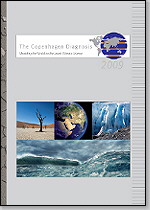Given the dated nature of the last report of the Intergovernmental Panel on Climate Change (IPCC), a panel of some of the world’s most respected climate scientists have put together an update called The Copenhagen Diagnosis.
The news is worse than predicted on every front.
- Global carbon dioxide emissions are up 40 per cent from 1990.
- The global warming trend has continued, despite a temporary decline in solar energy.
- Both Greenland and Antarctic ice-sheets are losing mass at an accelerating rates, as are glaciers the world over.
- Summer-time melting of Arctic sea-ice during 2007-2009 was about 40% greater than the average prediction from the IPCC’s last report.
- Global average sea-level has risen at a rate 80% above past IPCC predictions over the past 15 years.
- Several vulnerable elements in the climate system (e.g. continental ice-sheets. Amazon rainforest, West African monsoon and others) could pass irreversible tipping points if warming continues in a business-as-usual way throughout this century.
Even if global emission rates are stabilized at present–day levels, the Copenhagen Diagnosis advises that just 20 more years of emissions would give a 25% probability of warming exceeding 2oC, widely considered an overall tipping point.
If global warming is to be limited to 2oC above pre-industrial values, emissions need to peak between 2015 and 2020 and then decline rapidly. To stabilize climate, we need to reach near-zero emissions of CO2 and other long-lived greenhouse gases well within this century. Average annual per-capita emissions will have to shrink to well under 1 metric ton CO2 by 2050. This is 80-90% below the per-capita emissions in developed nations in 2000.
It’s also outside even the most optimistic scenario and the blockers and delayers are bringing to Copenhagen. As the Diagnosis team says, every year we delay action drives us closer to a tipping point beyond which lies a global environmental catastrophe unimagined in the human age. We can only hope that the negotiators are listening.
Subscribe to our newsletter
Stay up to date with DeSmog news and alerts







